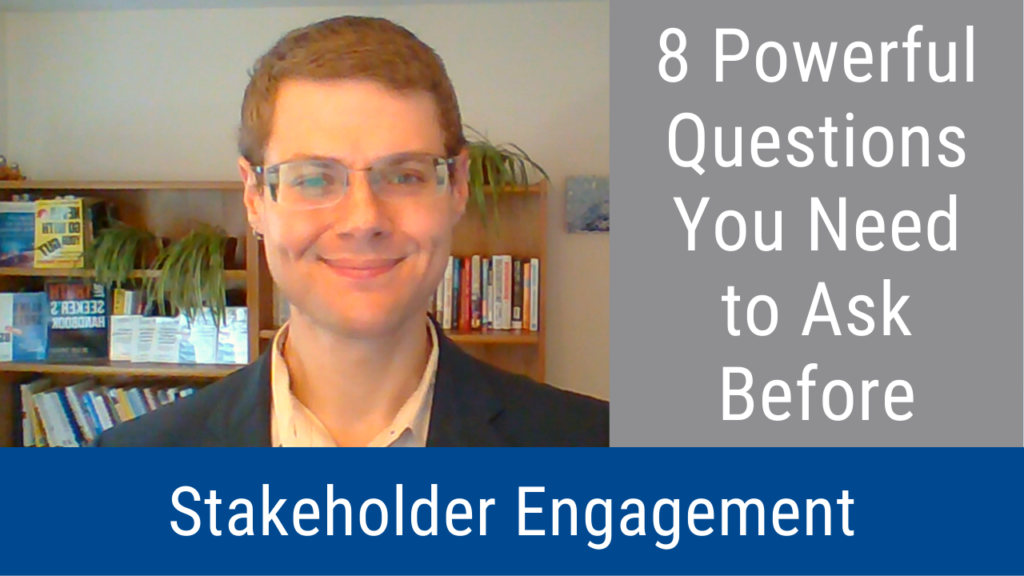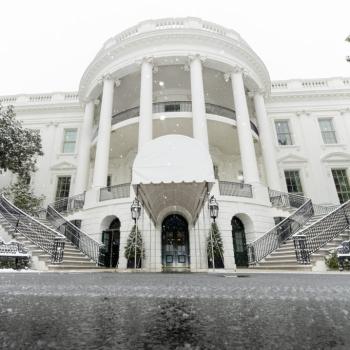
Asking the 8 Powerful Questions during a pre-engagement stakeholder assessment will lead to better engagement and stronger relationships with your stakeholders. That’s the key take-away message of this episode of the Wise Decision Maker Show, which describes the 8 powerful questions you need to ask before stakeholder engagement.
Video: “8 Powerful Questions You Need to Ask Before Stakeholder Engagement”
Podcast: “8 Powerful Questions You Need to Ask Before Stakeholder Engagement”
Links Mentioned in Videocast and Podcast
- Here’s the article on the 8 Powerful Questions You Need to Ask Before Stakeholder Engagement
- The book Never Go With Your Gut: How Pioneering Leaders Make the Best Decisions and Avoid Business Disasters is available here
- You are welcome to register for the free Wise Decision Maker Course
Transcript
Hello, everyone, and welcome to another episode of the Wise Decision Maker Show where we help you make the wisest and most profitable decisions. Today, I want to talk to you about the eight powerful questions you need to ask before effective stakeholder engagement. So you want to engage your stakeholders effectively, especially your key stakeholders, the ones who are most important to you, you know, it’s easy to want to say, Hey, I engage with all of my stakeholders, but really gotta identify the most important ones, the ones who are critical to you, that you probably heard about the Pareto principle that most things 20% of the key elements have 80% of the most impact. And that’s the same thing with your stakeholders, it’s going to be approximately the case that 20% or even less of your key stakeholders will have the vast majority of your impact. So you want to think about which stakeholders have a truly significant impact on your organization’s growth? Will they be key clients? Will they be very important employees? Are they critical suppliers, perhaps really important investors. So think about those folks who have a really significant impact on your organization’s growth and developing. Recognize that another aspect of being a key stakeholder is that this person or organization can’t be easily replaced. If they can be easily replaced, probably not key stakeholders, they’re probably pretty easily replaceable by definition. So you want to think about those ones who can’t be easily replaced, and those who have a truly significant impact. Finally, realize, the third aspect of being a key stakeholder is that the relationship is mutual between you and them. So you want to make sure that this is a mutual relationship, because most likely, they’re not going to be a key stakeholder very committed to you. If the relationship between you is not mutually profitable, mutually beneficial, mutually valuable. Now, they don’t have to be, you don’t have to be a key stakeholder to them, you know, it can be a huge company for a fortune 500 company, let’s say for which you are a small business, and you’re working for them. And they can be a key client for you. But they have to really get a lot of benefit from you from your work to be a truly key stakeholder. Otherwise, they can always find something else, someone else and they will not be a reliable partner. So they should not be considered a key stakeholder. Then you want to engage them before you assess with them. So as you assess with them as you think about how to assess these key stakeholders that are eight critical questions, you need to ask eight questions about how you engage with your key stakeholders. Now. Otherwise, if you don’t ask these questions that are way too many cognitive biases you will fall into. If you’ve been watching the wise decision maker show for a while, you know that cognitive biases are the dangerous judgment errors that our mind makes, just because of how our brain is wired. Due to the structure of the brain or evolutionary background. One of the most important problems cognitive biases, dangerous judgment errors regarding stakeholder engagement is called the false consensus effect. The false consensus effect refers to the fact that we tend to assume those others who are important to us share our perspective to a much greater degree than they actually do. You know, this is why in your personal life, you have a divorce rate of 40% plus in the United States. And of course, why about half of all startups fail within the first five years, and about 75% fail within the first 15 years. Because there’s way too many assumptions being made within the startup about what’s going on internally, you’ll often see business partners fail business teams fail on this basis, and key critical clients, you will fail your relationship with them if you make too many assumptions about them. And if you assume that you really understand what they want, the same thing about investors, same thing about suppliers, same thing about your key employees. So eight questions you gotta ask yourself for effective stakeholder engagement first, what are their feelings, their intuitions, their values, their goals, their incentives around the issue on which you’re engaging with them? Now, our feelings were the research I mean, you I often talk about feelings and people often get confused by Why talk about feelings? Well, if you look at the research on intuitions and feelings and emotions, you’ll see that our decision making around any issue is primarily emotion driven. 90% of our decisions of our behaviors come from how we feel, not from how we think. So you want to understand their feelings and their values. Of course their goals are intertwined with feelings, and there are incentives. These will often be material incentives, but often not they can be reputational incentives. They can be status incentives. They can be relationship incentives, relational incentives, there can be emotional incentives. So think about their incentives, and they are not necessarily going to be material of the often they will be in business relationships, then think about what is their story about their rounds associated? So that’s the second question. First question their feelings, values, goals and incentives. Second, their story, what is their story around this issue? What do they think about this issue? How do they feel what’s their narrative around this issue? We human beings are pattern matching and storytelling machines. So we understand the world through patterns, there are various patterns, and we make up stories about how these patterns intersect with each other about how events interact with each other. So you want to think about what is their story around the issue about which you’re engaging, and of course, the broader story around you on your relationship with them, then what’s their identity, their sense of self is tied to this issue. Now, very often in professional relationships, what you’ll see is that people’s professional status, their identity, as let’s say, for example, if you’re working on health care, and there are people’s identity tied to the issue might be someone who is working in health care might have a strong identity as wanting to save people’s lives and improve their health. So very many people unfortunately, often too often look at only the material incentives, and don’t look at their identity, their sense of self is tied to this issue. Finally, the fourth question regarding identity, this is somewhat different. So for question, this is transitioning to identity and an aspect of identity which ties back to the story. How are they the hero of their own story? So we talked about the story, their story around this issue, then you understand their identity, you understand their sense of self, not tie those things together? and understand how they are the hero in their own story around this issue. So whatever the issue is, people generally have a sense of being a hero, in their own story around any issue that’s involved, they see themselves as good, noble, moral, ethical, so think about how from their perspective with their incentives with their feelings, values and goals, with their story around this issue with their identity and sense of self, how would they be the hero in around this issue? Whatever you’re engaging with them on? Okay, so that’s the first four questions. Next, you’re transitioning more to the engagement and communication, think about? Why should they give their hero their sense of heroes, son status, hero in their own story, their sense of self, their values, goals, and so on? Why should they want to listen to you around this issue? What do they want? So what should they listen to your message? Think about these things? Given what you understand about them, their background, their story? Why should they listen to you? So that is a key question. That’s the fifth question, then you got to think about what obstacles would prevent them from listening to you from listening to your message and doing what you want. So think about why they should listen to you. And then you think about why they shouldn’t. What are the obstacles? That’s the sixth question. Okay, going on to question seven. How can you remove those obstacles? So think about how you can remove those obstacles, and increase the rewards? So that’s a great turning back to question five, why should they listen to you? So hopefully, there are some rewards. Because you know, if they don’t get any rewards from listening to emotional relating for identity, material, whatever, then they’re not going to do what you want. So you got to figure out what they should listen to you? What are the rewards for them listening to you? What are the obstacles? And then for question seven? How can you remove the obstacles? And how can you increase the rewards for them listening to you and doing what you want? So think about that? How do you frame your message? How do you frame your story? How do you give your own story in such a way that it removes the obstacles, the obstacles, they perceive, and increases the rewards they perceive? Because it’s all about them? Of course, it’s not about you. So this is about their perception. So you’re tying it to them. And you get to share your story or your message in a way that removes obstacles and increases rewards. Okay. So that’s kind of the, quote, The seven questions that you can analyze yourself. But the last question, eighth question, helps you go outside of yourself, because you really want to, it’s a key stakeholder, an important issue, otherwise, you wouldn’t be taking the time to do this. So you want to think about who you know, who can give you useful feedback on your answers to this pre engagement assessment. So those are the seventh engagement questions. And the eighth question is just as important. It’s really not something you want to leave behind. You want to make sure to run your ideas by someone who can give you effective feedback on them because you are not the stakeholder. You are not your key client or their representative, you’re not a key investor, you’re not a key supplier, you may not understand all aspects of their identity, all aspects of their emotions, you may be falling into the false consensus effect. Another big one here is optimism bias. I tend to fall into this all the time, where I tend to be too optimistic that other people will do what I think that they should do, because it seems like it aligns with their goals. But I might be mistaken about what their goals are, what their identity is, what their sense of self is, what their emotions are, what their incentives are. So run this by someone who can give you useful feedback. Ideally, someone who represents a demographic to which this key stakeholder belongs. So that’s how you got to be thinking about this. So those are the eight powerful questions you need to ask about stakeholder engagement, if you want to succeed with effectively engaging your key stakeholders. And this has been another episode of the wise decision maker show. Now there’s a case study on how to apply that method of eight powerful questions to ask before effective stakeholder engagement in the blog that’s linked in the show notes. So please make sure to check out this blog, if you want to see how this is done through the context of a case study on healthcare in particular. So check that out. There are several other blogs linked there that relate to effective stakeholder engagement. And that are going to be two books that I can recommend on effective stakeholder engagement. One is never go with your gut how pioneering leaders make the best decisions and avoid business disasters. And that will be about decision making risk management, regarding stakeholder engagement and all other sorts of decisions. Then the other one is called the blind spots between us how to overcome unconscious cognitive bias and build better relationships. And that will be on how to cultivate effective relationships, which is fundamental, of course for stakeholder engagement. So check those out. Now also linked in the show notes which they’ll be linked in the show notes, by the way, also linked in the show notes is a free subscription to the wise decision maker course. The wise decision maker course is an eight module course on making the wisest and most profitable decisions. So make sure to check that out at disasteravoidanceexperts.com/subscribe. And finally, I want to ask you to think about subscribing to whatever platform you heard this show on there you watch this show and we have a videocast and podcast. So please subscribe to it, click likely if you liked it. And if you think anybody might benefit from effective stakeholder engagement in your community, folks, you know in your network, please forward it to them and please share it on your social media and comment on whatever platform you’ve been listening to leave us a rating leave a review, so leave your thoughts we’ll be happy to hear them. Alright, I hope this episode of the Wise Decision Makers Show helps you make the wisest and most profitable decisions and friends till next time. Transcribed by https://otter.ai Originally Published at Disaster Avoidance ExpertsBio: An internationally-recognized thought leader known as the Disaster Avoidance Expert, Dr. Gleb Tsipursky is on a mission to protect leaders from dangerous judgment errors known as cognitive biases by developing the most effective decision-making strategies. A best-selling author, he is best known for Never Go With Your Gut: How Pioneering Leaders Make the Best Decisions and Avoid Business Disasters (Career Press, 2019), The Blindspots Between Us: How to Overcome Unconscious Cognitive Bias and Build Better Relationships (New Harbinger, 2020), and Resilience: Adapt and Plan for the New Abnormal of the COVID-19 Coronavirus Pandemic (Changemakers Books, 2020). He published over 550 articles and gave more than 450 interviews to prominent venues such as Inc. Magazine, Entrepreneur, CBS News, Time, Business Insider, Government Executive, The Chronicle of Philanthropy, Fast Company, and elsewhere. His expertise comes from over 20 years of consulting, coaching, and speaking and training as the CEO of Disaster Avoidance Experts. It also stems from over 15 years in academia as a behavioral economist and cognitive neuroscientist. Contact him at Gleb[at]DisasterAvoidanceExperts[dot]com, Twitter @gleb_tsipursky, Instagram @dr_gleb_tsipursky, LinkedIn, and register for his free Wise Decision Maker Course.














